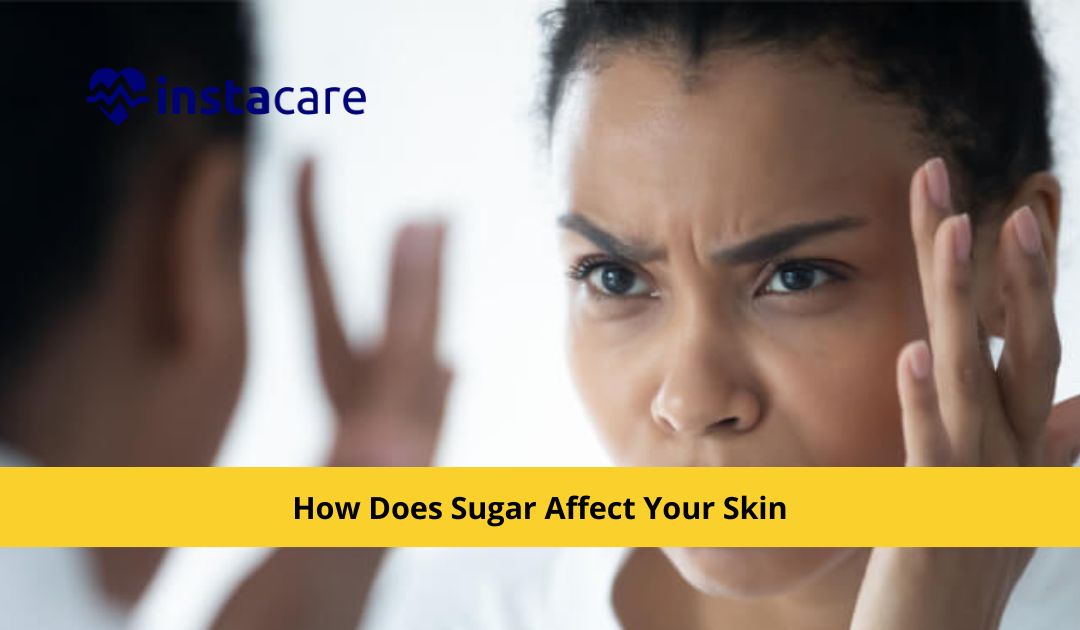Although sugar is one of the most prevalent foods in our diets, did you realize that it can also harm your skin? This blog post will go over how sugar damages your skin, how to spot the effects of sugar on your skin, and how to prevent and repair the damage.
What Is Sugar And How Does It Affect Your Skin?
A form of carbohydrate that gives our cells energy is sugar. But not all sugars are made equally. Natural sugars and added sugars are the two main categories of sugars. Fruits, vegetables, dairy products, and honey all contain natural sugars. Other nutrients, like fiber, vitamins, and minerals, are frequently included with them to assist in balancing their effects on our blood sugar levels and overall health.
Sugars that are added to foods and beverages during processing or preparation are known as added sugars. There are plenty of them, such as table sugar, high-fructose corn syrup, agave nectar, and maple syrup. They are frequently discovered in processed foods such as ice cream, soda, juice, cakes, cookies, and candies. They offer no nutritional value and only empty calories.
When we consume too much sugar, especially added sugars, it
can cause a spike in our blood sugar levels. This triggers a cascade of
hormonal reactions that can lead to inflammation, oxidative stress, and
glycation.
What Are The Signs Of Sugar-Induced Skin Damage?
Sugar-induced skin damage can manifest in various ways depending on your skin type, genetics, lifestyle, and environmental factors.
Some of the common signs of sugar-induced skin damage are:
1- Acne:
Sugar can increase the production of sebum (oil) and
inflammation in the skin, which can clog pores and cause acne breakouts.
2- Rosacea:
Sugar can trigger flushing and inflammation in the skin,
which can aggravate rosacea symptoms such as redness, bumps, and visible blood
vessels.
3- Eczema:
Sugar can worsen eczema symptoms such as dryness, itching,
cracking, and bleeding in the skin.
4- Psoriasis:
Sugar can increase inflammation and oxidative stress in the
body, which can exacerbate psoriasis symptoms such as scaling, flaking,
redness, and pain in the skin.
5- Wrinkles:
Sugar can damage collagen and elastin fibers in the skin
through glycation and oxidative stress, which can reduce the skin's ability to
retain moisture and resist gravity. This results in wrinkles, fine lines, and
sagging in the skin.
6- Dullness:
Sugar can dehydrate the skin and impair its natural ability
to exfoliate dead cells. This leads to a buildup of dull, dry, and rough skin.
7- Uneven tone:
Sugar can cause hyperpigmentation (dark spots) in the skin
by stimulating the production of melanin (pigment) and increasing oxidative stress.
This creates uneven tone, discoloration, and blotchiness in the skin.
How Can You Prevent And Reverse Sugar-Induced Skin Damage?
The best way to prevent and reverse sugar-induced skin damage is to reduce your intake of added sugars and increase your intake of natural sugars from fruits and vegetables. The American Heart Association recommends limiting added sugars to no more than 6 teaspoons (25 grams) per day for women and 9 teaspoons (38 grams) per day for men.
Some tips to reduce your sugar intake are:
- Read nutrition labels carefully and avoid foods and drinks
that have added sugars or high-fructose corn syrup as one of the first
ingredients.
- Choose fresh or frozen fruits over canned or dried fruits
that may have added sugars or syrups.
- Drink water or unsweetened tea or coffee instead of soda or
juice that may have added sugars or artificial sweeteners.
- Snack on nuts or seeds or cheese or plain yogurt instead of
candy or cookies or ice cream that may have added sugars or fats.
- Use natural sweeteners such as honey or maple syrup or
stevia in moderation instead of table sugar or artificial sweeteners.
Conclusion
Sugar can affect your skin in various ways, depending on how much you consume and how your body reacts to it. Sugar can cause skin aging, inflammation, and vascular problems that can alter your skin's appearance and health. To prevent or reduce these effects, it is advisable to limit your intake of refined carbs and sugars and follow a balanced diet that includes healthy sources of sugar like fruits and dairy products.


